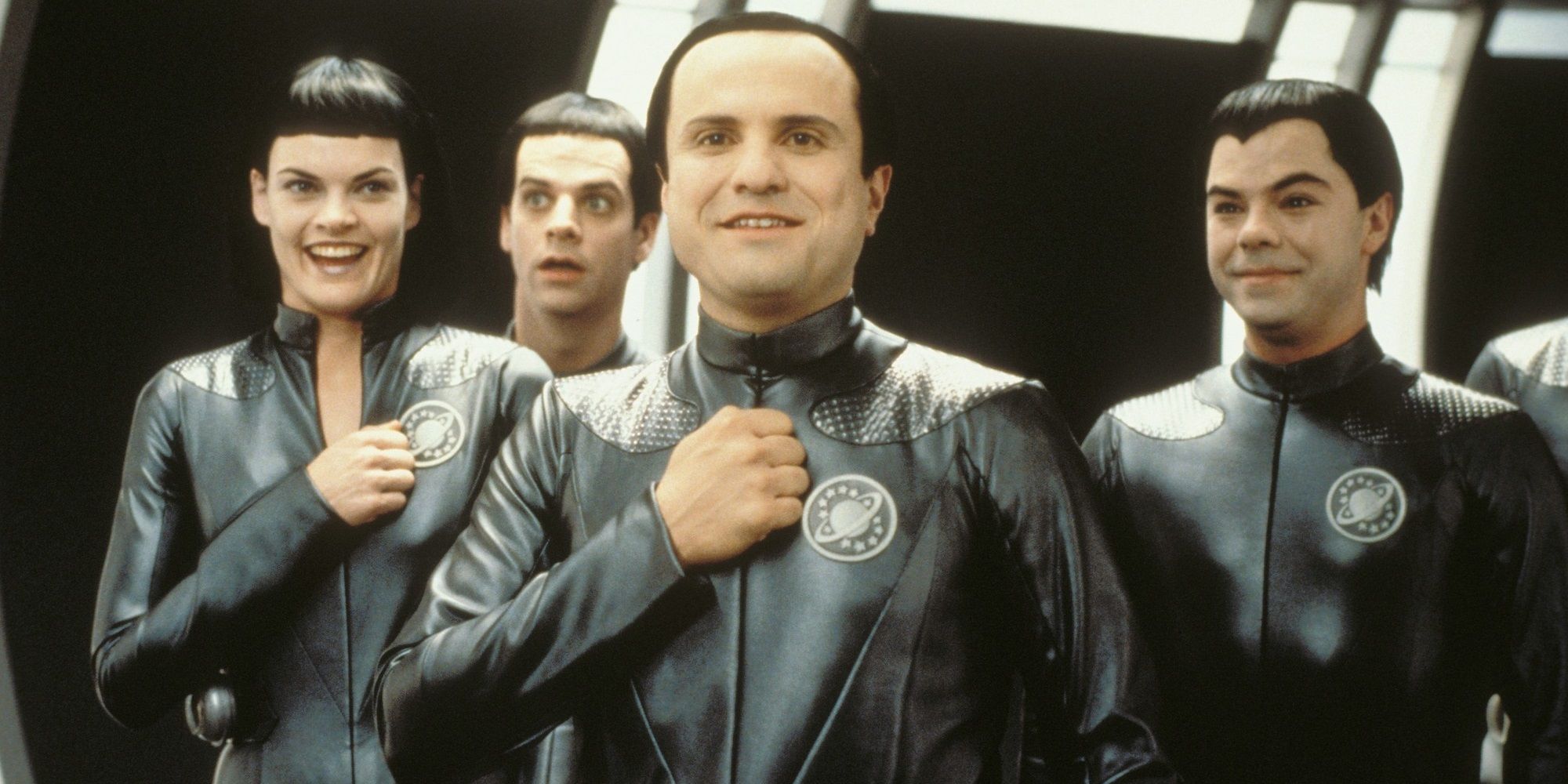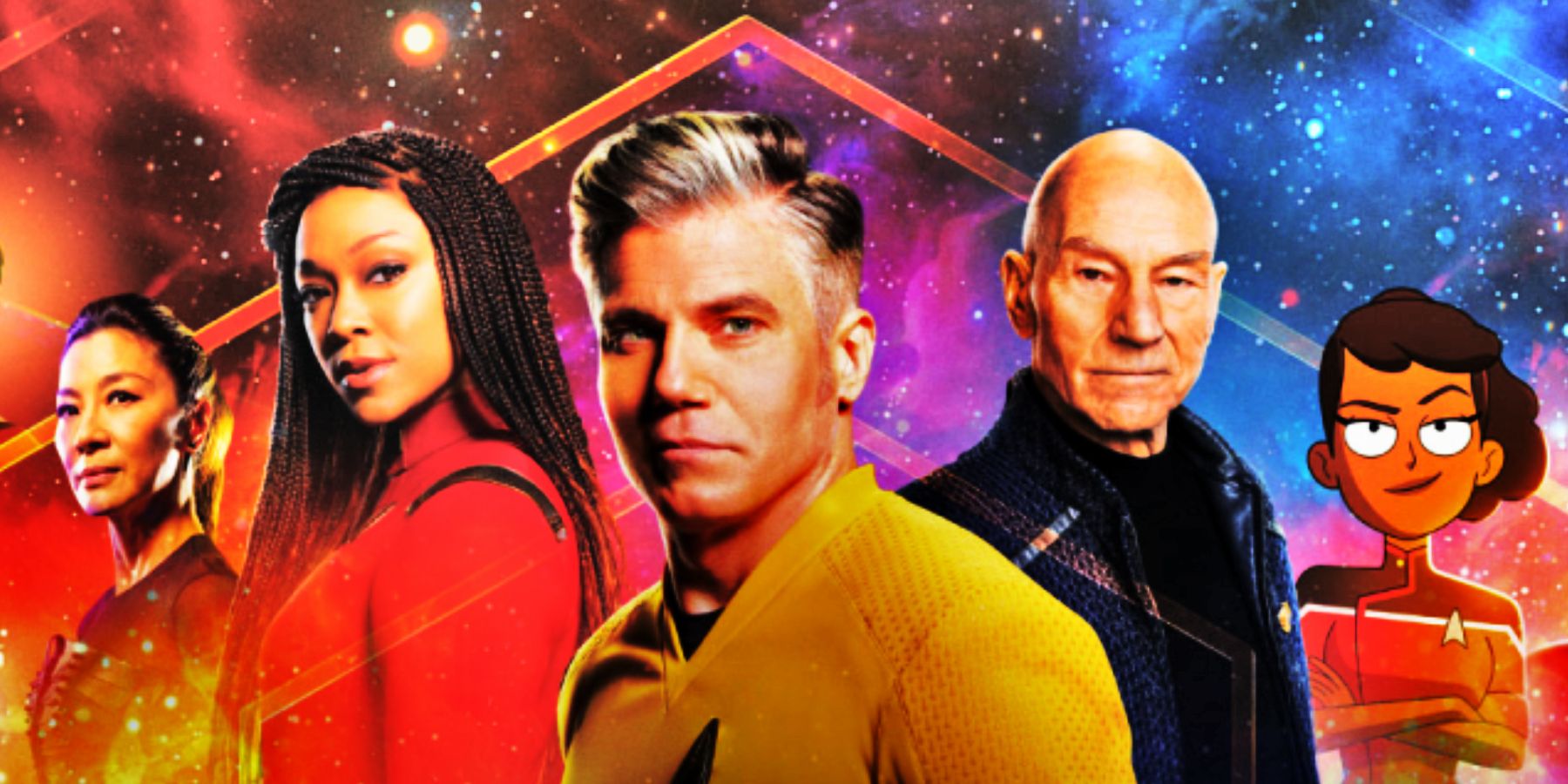Netflix’s Black Mirror has a great Star Trek parody, but there’s a 26-year-old sci-fi spoof that still has it beat. In the Black Mirror season 4 episode “USS Callister”, game developer Robert Daly (Jesse Plemons) uses an illegal device to program sentient copies of co-workers into Infinity, a game based on the fictional Star Trek-style show Space Fleet. Daly’s sadism as the USS Callister captain is countered by newcomer Nanette Cole (Cristin Milioti), who returns in Black Mirror season 7, episode 6, “USS Callister Into Infinity”, to fend off worsening threats, both inside the MMORPG and out of it.
There’s no doubt that Black Mirror‘s Space Fleet is supposed to be Star Trek, and the same is true for the fictional sci-fi show Galaxy Quest in the 1999 movie of the same name. Tim Allen’s washed-up leading actor, Jason Nesmith, treats the show that made him famous as a joke, until he meets the Thermians: actual aliens who believe the Galaxy Quest show really happened. The Thermians recreated the show’s technology because they need help from the NSEA Protector’s crew, so Galaxy Quest‘s cast have to embody their roles again—and Jason learns why the show matters.
Galaxy Quest Parodies Star Trek So Well, Even Black Mirror Can’t Match It
Galaxy Quest Understands Star Trek’s Thorough History
Galaxy Quest is a Star Trek parody that has so far been unmatched, even by Black Mirror‘s pair of USS Callister episodes. Both effortlessly recreate the Star Trek aesthetic with their starship bridge sets and colorful uniforms; and mimic Trek technology perfectly, with transporters, communicators, and sliding starship doors that go fwoosh. But Galaxy Quest is a more thorough parody of Star Trek than Black Mirror‘s USS Callister episodes, with details about its fictional show’s behind-the-scenes history. Numerous references to its fandom’s deep lore, in-jokes, and trivia are peppered throughout Galaxy Quest, making it feel lived-in and real.
More than Black Mirror, Galaxy Quest understands the characters—and actors—that Star Trek returns to, time and again. Tim Allen’s Nesmith is a clear stand-in for William Shatner, Tommy Webber (Daryl Mitchell) plays Wesley Crusher (Wil Wheaton) parody Lieutenant Laredo, and Guy Fleegman (Sam Rockwell) is a nameless redshirt. Like actresses in the Rick Berman era, Gwen DeMarco (Sigourney Weaver) calls out the casual Sєxism in Star Trek. And Alexander Dane (Alan Rickman) is a Shakespearean actor who wears a latex prosthetic to play Dr. Lazarus, who represents Star Trek‘s alien outsider, with his catchphrase—”By Grabthar’s hammer, you shall be avenged“.
Galaxy Quest’s Star Trek Parody Feels More Like A Tribute Than A Lampoon
Galaxy Quest Loves Star Trek Fans
Galaxy Quest‘s Thermians and Black Mirror‘s Robert Daly both recreate their beloved show with technology, but there’s a key difference that makes Galaxy Quest a tribute to Star Trek instead of a lampoon of it. Like Star Trek: Lower Decks, Galaxy Quest embraces Trek in all its forms, whether it’s genuinely sublime or deeply weird. More importantly, Galaxy Quest celebrates a joyful range of Star Trek fandom, from fans crushing on actors and casual daily con-goers, to young cosplayers with deeply specific knowledge and Quellek (Patrick Breen), a Thermian who lives and dies by Lazarus’ honor code.
Both shows-within-shows have a mysterious plot device that represents their point of view: Black Mirror‘s Heart of Infinity is a dystopic nightmare for one character, whereas Galaxy Quest‘s Omega-13 is a machine that grants second chances.
It’s not that Black Mirror is mocking Star Trek, but its message is a departure from Galaxy Quest‘s earnest celebration of fandom as a good thing. By zeroing in on Robert Daly as a certain kind of fan whose love is measured in memorabilia and screen accuracy, Black Mirror calls out toxic Star Trek fans. Daly has as much deep knowledge as the Thermians, but the Thermians have accepted Star Trek‘s morals, and Robert has clearly missed the point of the show. As a result, Daly’s fandom is hollow and desperately lonely, instead of a blueprint for a better future.
26 Years Later, Galaxy Quest Is More Relevant Than Ever
How Will New Star Trek Fans Celebrate Their Fandom?
26 years later, Galaxy Quest is more relevant than ever, thanks to the resurgence of new Star Trek shows on Paramount+. At the end of the Galaxy Quest movie, the actors have a newfound love for the world they helped create. They’ve seen the Galaxy Quest TV show through the eyes of fans, and signed on for a 2000s-era revival. Now, Star Trek: Strange New Worlds exists because fans demanded it after Star Trek: Discovery season 2. Legacy Star Trek characters have returned in new shows, like the Star Trek: The Next Generation cast reunion in Star Trek: Picard.
Even in Star Trek itself, a common theme is how one holds onto Federation values in a world that doesn’t share them: Star Trek: Deep Space Nine‘s Dominion War, Star Trek: Voyager in the Delta Quadrant, and Star Trek: Discovery in the 32nd century.
Galaxy Quest is more than a Star Trek parody, because it shows what happens when people genuinely embrace Star Trek‘s philosophy. Galaxy Quest‘s fictional actors learn to live the values they embodied on TV, like their fans do, and they change for the better because of it. Black Mirror‘s Robert Daly tries to make Space Fleet‘s idealistic world as real as technologically possible, but without the Federation ideals that make Star Trek work, Daly turns cruel, and the simulation falls apart. Until another parody shows us how to get to Star Trek‘s future from here, Galaxy Quest will remain unmatched.







